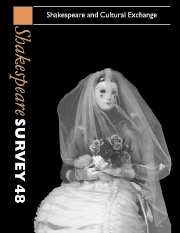Book contents
- Frontmatter
- Shakespeare Translation as Cultural Exchange
- Shakespeare, Theatre Production, and Cultural Politics
- ‘Amphitheaters in the Body’: Playing with Hands on the Shakespearian Stage
- ‘Shakespur and the Jewbill’
- Wilhelm S and Shylock
- Pilgrims of Grace: Henry IV Historicized
- Holy war in Henry V
- Hamlet and the Anxiety of Modern Japan
- Hamlet’s Last Words
- Venetian Culture and the Politics of Othello
- ‘My Music for Nothing’: Musical Negotiations in The Tempest
- The Tempest and Cultural Exchange
- Caliban and Ariel Write Back
- Shakespearian Rates of Exchange in Czechoslovakia 1945–1989
- ‘Are you a Party in this Business?’ Consolidation and Subversion in East German Shakespeare Productions
- The Martyred Knights of Georgian Shakespeariana
- Shakespeare Performances in England, 1993–1994
- Professional Shakespeare Productions in the British Isles, January – December 1993
- 1 Critical Studies
- 2 Shakespeare’s Life, Times, and Stage
- 3 Editions and Textual Studies
- Books Received
- Index
Hamlet and the Anxiety of Modern Japan
Published online by Cambridge University Press: 28 March 2007
- Frontmatter
- Shakespeare Translation as Cultural Exchange
- Shakespeare, Theatre Production, and Cultural Politics
- ‘Amphitheaters in the Body’: Playing with Hands on the Shakespearian Stage
- ‘Shakespur and the Jewbill’
- Wilhelm S and Shylock
- Pilgrims of Grace: Henry IV Historicized
- Holy war in Henry V
- Hamlet and the Anxiety of Modern Japan
- Hamlet’s Last Words
- Venetian Culture and the Politics of Othello
- ‘My Music for Nothing’: Musical Negotiations in The Tempest
- The Tempest and Cultural Exchange
- Caliban and Ariel Write Back
- Shakespearian Rates of Exchange in Czechoslovakia 1945–1989
- ‘Are you a Party in this Business?’ Consolidation and Subversion in East German Shakespeare Productions
- The Martyred Knights of Georgian Shakespeariana
- Shakespeare Performances in England, 1993–1994
- Professional Shakespeare Productions in the British Isles, January – December 1993
- 1 Critical Studies
- 2 Shakespeare’s Life, Times, and Stage
- 3 Editions and Textual Studies
- Books Received
- Index
Summary
The context in which Shakespeare made his first appearance in Japan was a rather curious one. It was in connection with a most unlikely book called Self-Help by the Victorian moralist, Samuel Smiles. Published in London in 1859, and now read, I suspect, only by specialists on Victorian ideology, the book preaches through many an instructive episode the virtues of perseverance and self-help required for achieving the all-important goal of respectability in society. It was translated into Japanese in 1871, three years after the Meiji Restoration, and instantly became one of the best-selling books of the time. Why this popularity of what seems to us one of the most boring specimens of Victorian didacticism? The reason was simple: the book answered, or so it seemed, the need of a nation which, after nearly three centuries of isolation, was eagerly seeking whatever was new and modern. New and modern of course meant Western. ‘Westernize!’ was the greatest, or indeed the only motto of the age. And people jumped at Smiles’s collection of prosaic homilies as a display of information about Western manners and customs, as a text book of Western morality, and even as a guidebook on ‘how to live’ in a brave new world of bunmei-kaika (civilization and enlightenment) where anyone, irrespective of his (not her, of course) class, at least in principle, could make a successful career in life.
Smiles first mentions Shakespeare as an exemplary man of self-help, 'a hard worker' who made his progress from 'a very humble rank' to a successful playwright. Then, as an epigraph to the chapter entitled 'Money — Use and Abuse', he quotes three lines from Shakespeare without naming the exact source: 'Neither a borrower nor a lender be; / For loan oft loses both itself and friend, / And borrowing dulls the edge of husbandry.'
- Type
- Chapter
- Information
- Shakespeare Survey , pp. 99 - 112Publisher: Cambridge University PressPrint publication year: 1996
- 1
- Cited by



